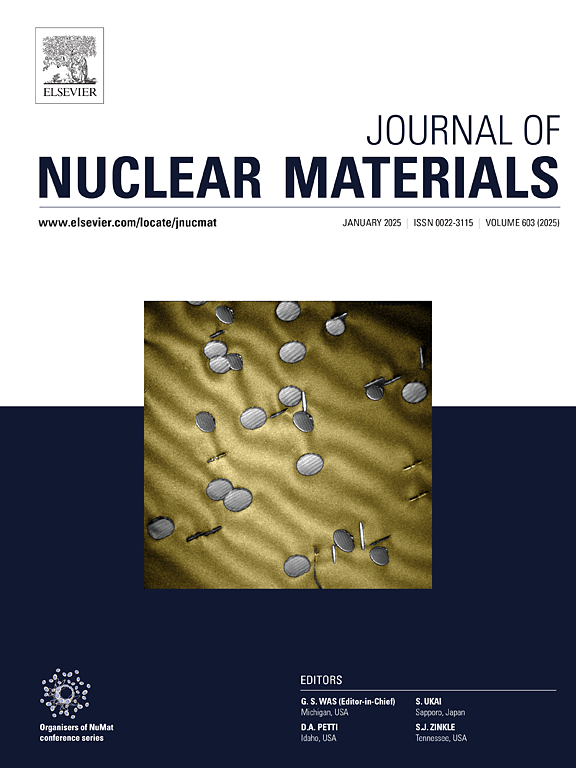LBE corrosion behavior of helium pre-irradiated martensitic steel
IF 2.8
2区 工程技术
Q3 MATERIALS SCIENCE, MULTIDISCIPLINARY
引用次数: 0
Abstract
In the design of the spallation target of CiADS, T91 steel was selected for the most critical component, the beam window. A Si-modified martensitic steel (SIMP) has been currently developed, which has better corrosion resistance and is planning to replace T91 as a material of beam window in the future. In order to assess the effect of irradiation damage on the microstructure evolution and corrosion behavior of the SIMP, the pre-irradiated samples with irradiation doses from 5 × 1015 to 3 × 1017 He/cm2 exposed in static lead-bismuth eutectic (LBE) with saturated oxygen at 350 °C for 4000 h were investigated. Results show that pre-irradiation neither change the double-layer structure of the oxide layer nor significantly affect the corrosion rate. This may be due to the slow diffusion of elements at low temperatures, and the low irradiation dose not reaching the threshold for triggering accelerated corrosion.
氦预辐照马氏体钢的 LBE 腐蚀行为
在 CiADS 的溅射靶设计中,最关键的部件--束窗--选用了 T91 钢。目前已开发出一种具有更好耐腐蚀性能的硅改性马氏体钢(SIMP),并计划在未来取代 T91 作为束窗材料。为了评估辐照损伤对 SIMP 微观结构演变和腐蚀行为的影响,研究了在 350 °C 饱和氧静态铅铋共晶(LBE)中暴露 4000 小时的预辐照样品,辐照剂量为 5 × 1015 至 3 × 1017 He/cm2。结果表明,预辐照既不会改变氧化层的双层结构,也不会显著影响腐蚀速率。这可能是由于元素在低温下的扩散速度较慢,而且辐照剂量较低,没有达到引发加速腐蚀的临界值。
本文章由计算机程序翻译,如有差异,请以英文原文为准。
求助全文
约1分钟内获得全文
求助全文
来源期刊

Journal of Nuclear Materials
工程技术-材料科学:综合
CiteScore
5.70
自引率
25.80%
发文量
601
审稿时长
63 days
期刊介绍:
The Journal of Nuclear Materials publishes high quality papers in materials research for nuclear applications, primarily fission reactors, fusion reactors, and similar environments including radiation areas of charged particle accelerators. Both original research and critical review papers covering experimental, theoretical, and computational aspects of either fundamental or applied nature are welcome.
The breadth of the field is such that a wide range of processes and properties in the field of materials science and engineering is of interest to the readership, spanning atom-scale processes, microstructures, thermodynamics, mechanical properties, physical properties, and corrosion, for example.
Topics covered by JNM
Fission reactor materials, including fuels, cladding, core structures, pressure vessels, coolant interactions with materials, moderator and control components, fission product behavior.
Materials aspects of the entire fuel cycle.
Materials aspects of the actinides and their compounds.
Performance of nuclear waste materials; materials aspects of the immobilization of wastes.
Fusion reactor materials, including first walls, blankets, insulators and magnets.
Neutron and charged particle radiation effects in materials, including defects, transmutations, microstructures, phase changes and macroscopic properties.
Interaction of plasmas, ion beams, electron beams and electromagnetic radiation with materials relevant to nuclear systems.
 求助内容:
求助内容: 应助结果提醒方式:
应助结果提醒方式:


